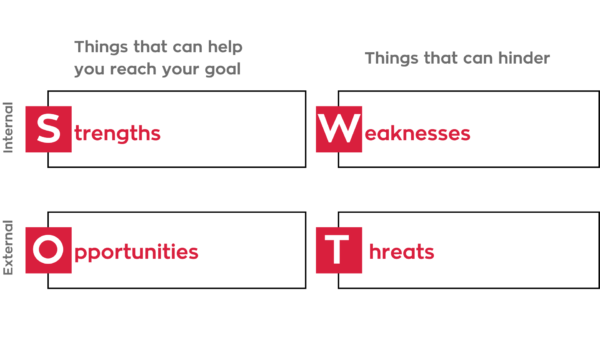When it works for projects and businesses, why not apply it to ourselves in the path to self-improvement or career growth? Let’s take a look at how to go about it.
What is Personal SWOT Analysis?
It is an exercise in self-introspection to help you understand yourself better. Simply put, you get to know your personal strengths, weaknesses, opportunities and threats.
- Strengths: The things you are good at, that separate you from others.
- Weaknesses: The things that need improvement, that stop you from exploring your full potential
- Opportunities: Areas/ Chances that can make you potentially thrive
- Threats: Elements that are potentially harmful to you or distracting you.
In your introspection, you also take into account, in addition to your professional skills, your soft skills, emotional components and interpersonal skill set.
When to do a SWOT analysis on yourself
You can do it at any point in your life to keep tabs on how you are doing. Ideally, you need to do a personal SWOT analysis before making a big life change. Before changing career, paths, before a job interview or choosing courses or colleges, a personal SWOT analysis will give you a better sense of who you are.
Why do a personal SWOT?
It can help you identify, formulate or evaluate your personal goals. If you are looking for a career change or applying to a new job, the results of the SWOT table can help you tailor fit your resume or application that highlights your best side. It is easier to develop a concrete action plan based on your personal SWOT analysis.
How to go about it?
These are the points you introspect and write about yourself. At the end of this section is a SWOT example for students.
The Strengths
This is usually the easiest place to begin. It fills you with positivity and makes you feel good about the whole exercise. You look for the things that you are good at and something that makes you special. Do not underestimate any of your strengths.
If you are finding it difficult to list them out, here’s a set of hints that can guide you to the answers:
- The things you consider your biggest successes
- Your degrees,certifications and qualifications
- Other knowledge-based skills (knowledge of new technology, for instance)
- Values, communication skills, Soft-skills, personality traits (leadership, honesty, empathy, etc.) that define you
- Independent projects that you have taken up and completed
- What your trusted friends and family feel about you
- Your professional development and networks
If you are the kind that tries to minimise your talents/ strengths or exaggerate them, try bringing in concrete examples for all the qualities you are listing here. It can also help if you can reach out to trusted people in your circle to get other points of view on your strengths.
The Weaknesses
This is slightly harder to put down, but is integral to the process. Not knowing your weaknesses can blindside you in an interview or in the middle of a job. This is for your eyes only, so be as honest as you can. And remember, it is not meant to demolish your self esteem but give you targets to work on.
- The times you have made mistakes
- Qualifications you are missing
- The things/ tasks you usually avoid
- Your vices/ bad habits
- The instances where people have complained about you (validly, of course)
The Opportunities
Your list of opportunities will depend on why you are doing the analysis. If you are looking for new work opportunities for career development, then those specific opportunities are what you will look for. Your list of opportunities must ultimately build towards the reaching of your goal, whether it is jobs, education or personal life choices.
You look for opportunities that will develop your potential, the kind of courses that you will be good at, asking questions such as “is your industry growing?”, the networking who can help you with it and so on…
The Threats
In a business analysis, threats usually refer to competitors. However, when you are doing a personal analysis, you look for those who exacerbate your weaknesses or act as a hindrance in achieving your personal or career goals.
- Is there someone/ something in your life holding you back?
- Are there any particular things that drain you out?
- Are there any personality traits you consider your weakness?
- Is there any advancement in your field that you are not keeping up with?
Here is a personal SWOT analysis example. I research and write articles for TC Global Insights. Here is a SWOT analysis of my job as a content writer.

Remember, just filling this table is not the end of the analysis. The next step is to use these results and create a realistic, actionable plan or a roadmap that is built on these lines.
- Find more opportunities that are suited to your strengths.
- Turn your weaknesses into learning opportunities and develop new skills.
- The area where your weaknesses and threats overlap can cause significant obstacles. Find ways to manage them.
And thus you have a simple, organised plan in your path towards personal development!








![Best Universities in New Zealand for International Students [2025 Rankings]](https://tcglobal.com/wp-content/uploads/2025/09/Best-Universities-in-New-Zealand-for-International-Students-2025-Rankings-600x338.png)